Opinion: Global warming threatens livestock farming as we know it
 © Tim Scrivener
© Tim Scrivener These are challenging times for my farm. My main enterprises are beef and sheep, so not only am I extremely dependent on the soon-to-be-reduced-then-disappear-entirely BPS for my livelihood.
But I now have the best climate scientists in the world bearing down on me to point out that livestock farming is responsible for 20% of all greenhouse gas (GHG) emissions.
The science is undeniable. This month the journal Nature published the most comprehensive study ever undertaken on the impact of food production on the global environment.
See also: What climate change means for the way we farm
Dr Marco Springmann at the University of Oxford, who led the research team, said that with a world human population due to rise by 2.3 billion by 2050 to a total of 10 billion, the implications of continuing to farm and eat the way we do now are “shocking”, as global temperatures will rise by 3C.
His team concluded that, unless we wish to risk “the sustainability of the whole system”, UK citizens will need to eat 90% less pork, beef and lamb, and half the amount of poultry and dairy.
At the same time, people will need to increase the amount of legumes they eat by five times, and nuts and seeds by four times.
It goes without saying that the implications of this for UK livestock farmers are appalling. My first reaction, when faced with such scientific findings, is to bury my head in my methane-emitting dung heap and wish they would go away.
But, far from going away, the evidence that livestock farming contributes to global warming (though GHG emissions), catastrophic pollution of seas (through fertilizer leaching), loss of biodiversity (through farming intensification) and species extinctions (through the relentless advance of the global agricultural footprint) becomes ever clearer.
What can be done?
So, can we convince consumers (and, indeed, ourselves) that eating and producing meat and dairy products is OK for the planet?
I suggest that, rather than ignore Dr Springmann’s warnings, we need to work with scientists to find ways of reducing livestock farming’s environmental impact.
Some research, for example, has been done to show that methane from housed livestock can be captured (but do we really want what few farm animals are left to be confined to sheds all their lives?).
Other research has suggested that the incorporation of seaweed into cattle diets can massively reduce their methane emissions.
(Apparently, the reason that cattle emit so much methane is that eating grass is an “adaption” they have made from their wild ancestors, which grazed a wide range of plants in forests).
It’s hardly a new idea, but farmers could source nitrogen in pastures by planting more clover and kick the habit of using ammonium nitrate – a proportion of which evaporates into the air as N2O (which is 300 times more “warming” to the atmosphere than CO2).
There are those like farmer and environmentalist Simon Fairlie, author of Meat: A Benign Extravagance, who argue that certain sorts of extensive sheep and cattle grazing on the kind of marginal land that would otherwise not be used for farming are environmentally sustainable.
But even if Fairlie is right and even if a whole range of more environmentally-friendly livestock farming techniques become available, the truth is that meat and dairy consumption will still need to be drastically reduced if we are to have a planet that we can live on.
